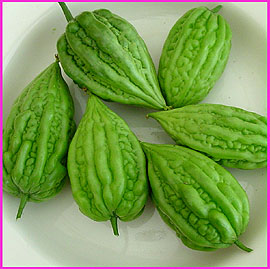Gymnema Sylvestre
Main use: Lowering blood sugar
Typical dosage: 200 to 250 milligrams twice daily.
Also known as “sugar destroyer,” the plant reduces the ability to detect sweetness. It’s regarded as one of the most powerful herbs for blood-sugar control. It may work by boosting the activity of enzymes that help cells use glucose or by stimulating the production of insulin. The drug Actos was designed to lower blood sugar. Unlike Actos, Gymnema Sylvestre has no link to bladder cancer.
Bitter Melon
 Main use: Lowering blood sugar
Main use: Lowering blood sugarTypical dosage: 50 to 100 milliliters (approximately 3 to 6 tablespoons) of the juice daily.
This fruit help cells use glucose more effectively and block sugar absorption in the intestine. However, gastrointestinal problems are possible side effects.
 Prickly Pear Cactus
Prickly Pear CactusMain use: Lowering blood sugar
Typical dosage: If you eat it as a food, aim for 1⁄2 cup of cooked cactus fruit a day. Otherwise, follow label directions.
You may be able to find this fruit in your grocery store, but if not, look for it as a juice or powder at health food stores. Researchers speculate that the fruit may possibly lower blood sugar because it contains components that work similarly to insulin. The fruit is also high in fiber. Unlike some type 2 diabetes medication, it does not cause weight gain.
Fenugreek
Main use: Lowering blood sugar
Typical dosage: 5 to 30 grams with each meal or 15 to 90 grams with one meal per day.
These seeds have been found to lower blood sugar, increase insulin sensitivity, and reduce high cholesterol. The effect may be partly due to the seeds’ high fiber content. The seeds also contain an amino acid that appears to boost the release of insulin.
Main use: Lowering blood sugar
Typical dosage: 5 to 30 grams with each meal or 15 to 90 grams with one meal per day.
These seeds have been found to lower blood sugar, increase insulin sensitivity, and reduce high cholesterol. The effect may be partly due to the seeds’ high fiber content. The seeds also contain an amino acid that appears to boost the release of insulin.
Ginseng
Main use: Lowering blood sugar
Typical dosage: 1 to 3 grams a day in capsule or tablet form, or 3 to 5 milliliters of tincture three times a day.
Known for its immune-boosting and disease-fighting benefits, this Chinese herb has several positive diabetes studies behind it. Researchers have found that ginseng slows carbohydrate absorption, increases cells’ ability to use glucose, and increases insulin secretion from the pancreas.
Typical dosage: 1 to 3 grams a day in capsule or tablet form, or 3 to 5 milliliters of tincture three times a day.
Known for its immune-boosting and disease-fighting benefits, this Chinese herb has several positive diabetes studies behind it. Researchers have found that ginseng slows carbohydrate absorption, increases cells’ ability to use glucose, and increases insulin secretion from the pancreas.



No comments:
Post a Comment